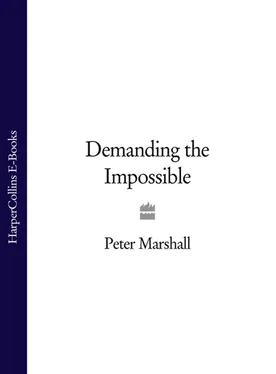At the same time, while opposing power over others, anarchists are not necessarily averse to power over oneself in the form of self-discipline, self-management, or self-determination. Given the unequal distribution of power between the rulers and the ruled, Bookchin has borrowed the language of liberation movements and made out a case for ‘empowering’ the weaker members of society. 55 And they are not merely concerned with political power in the form of the State and government, but with economic power in society and patriarchal power in the family.
Anarchists are opposed to all power which is coercive and non-reciprocal, especially in the sense of domination which involves force and conflict between two parties. But they sometimes wield a form of power in trying to influence others by making things unpleasant. Indeed, in the place of law, Godwin and Kropotkin both look to public censure to reform wrongdoers. Tucker might well reduce ethics to the sole moral law of ‘Mind your own business’, but he is ready to exert ‘the influence of reason; the influence of persuasion; the influence of example; the influence of public opinion; the influence of social ostracism; the influence of unhampered economic forces; the influence of better prospects …’ 56 The two principles would seem to be contradictory, and the latter form of influence undoubtedly involves a form of coercive power.
The desire to have power over oneself is quite compatible with the anarchist position. But as Paul Goodman has pointed out, people live quite happily without ‘power’ that manages or coerces from outside. Most human activities moreover do not need external motivations in the form of reward or punishment. 57
Anarchists are well aware that an authoritarian upbringing and education produce people who are either submissive or imperious types. As Alfred Adler observed, ‘the servile individual lives by the rules of others, and this type seeks out a servile position almost compulsively’. 58 At the same time, they recognize with Hobbes and Adler that the will to power over others is a common tendency amongst human beings. They are aware that, given the opportunity, not only do ex-slaves often try to become masters, but oppressed men try to find weaker beings to lord it over. But anarchists do not see that this tendency is intrinsic in human nature, but rather a product of our authoritarian and hierarchical society. They reject the view that the only possible human relationship is that in which one issues orders and the other obeys, one asserts himself and the other cringes. Such an unequal distribution of power enslaves both the ruler and the ruled. Anarchists look to a time when there will no longer be masters and servants, leaders and followers, rulers and ruled.
Anarchists have therefore principally been concerned with the way in which organizations and individuals have acquired power over people’s lives. In the past, anarchists rejected power over each other, but still thought it was necessary to increase power and control over nature. Kropotkin not only entitled one his books The Conquest of Bread but argued like Marx that industrial progress required ‘conquest over nature’. 59 Despite this, Malatesta still criticized Kropotkin for his view of natural harmony, and insisted that men must combine to harness the ‘hostile forces of Nature’. He even went so far as to define anarchy as ‘the struggle, in human society, against the disharmonies of Nature’. 60
More recently however anarchists have been increasingly concerned not only with the unequal distribution of power between human beings, but man’s power over nature. Indeed, Murray Bookchin has traced the origin of man’s destructive domination of nature to man’s domination over man and woman and calls for the dissolution of hierarchy. 61 Breaking with the historical Western anarchist tradition, he has developed an organicist view which see man as an integral part of nature. Working within a similar framework of social ecology, John Clark has also argued that a thoroughgoing anarchist critique is ‘a critique of all forms of domination’ that block the attainment of the goal of ‘universal self-realization’. 62
Anarchism as a philosophy wishes to dissolve all forms of authority and power, and if possible, seeks their complete abolition. All anarchists reject political authority in the form of the State and government, and most reject the moral authority of exceptional individuals. Where some allow the authority of competence, they stress that it must be based on accountability and consent. The ideal still remains for all people to judge and act for themselves and not to rely on experts.
Given the present unequal distribution of power, they would prefer it to be spread more evenly. They recognize the right of the individual to have power over his or her own person, but ultimately they prefer a situation where no one has the possibility or desire to impose his or her will on others. More recently, anarchists have gone beyond traditional humanism and called for an end to power over nature itself. In a condition of anarchy, there would be no State and thus no concentration of force or political specialization. 63 Human beings would be equal partners in a non-hierarchical world without domination. And while it may be impossible to realize in practice, the ultimate goal would be to achieve the complete absence of imposed authority and coercive power.
What distinguishes the democratic ideal from other political ideals is its attempt to combine liberty and equality. Anarchists are democratic in a broad sense. They would agree with Plato that the ends of democracy are liberty, equality and variety, and most would add like the French revolutionaries, fraternity. But it is a commonplace of liberal political theory that liberty and equality are incompatible. Anarchists are as aware as De Tocqueville and J. S. Mill of the potential dangers of the tyranny of the majority and the triumph of mediocrity. They do not want to submerge the individual in the community or level all society to one common standard of grey uniformity. They reject all rulers, whether one man, a few, or the ‘people’. Government, even in Abraham Lincoln’s definition as ‘government of the people by the people for the people’, is inadmissible. Nevertheless, unlike socialists and liberals, they seek a genuine resolution of liberty and equality, and believe that everyone has an equal claim to be free.
Anarchists go beyond the liberal concept of equality as equality before the law. Equality before the law, they point out, does not mean the end of injustice, for all people could be treated with equal unfairness under unjust laws. Moreover, if structural inequalities exist in society, the application of the law is likely to be unequal: one law for the rich, and another for the poor. Since they reject man-made law as an interference with personal freedom, clearly any legal concept of equality is inadequate.
As for the doctrine of equal opportunity to develop one’s talents, anarchists do not deny that everyone should have an equal claim to self-development. But they recognize that the principle of equal opportunity is fundamentally conservative since existing society with its hierarchy of values only supports the opportunity to develop those talents and abilities which it considers worth developing. The application of the principle will also increase inequalities by creating a society ruled by a meritocracy. Above all, it is founded on an antagonistic, competitive model of society in which there are more losers than winners in the race for goods and status.
In general, then, anarchists go beyond the liberal concept of equality as equality before the law or equality of opportunity. Like the socialists, they have a commitment to economic and social equality. But different anarchist thinkers try to combine equality with liberty in very different ways.
Читать дальше












